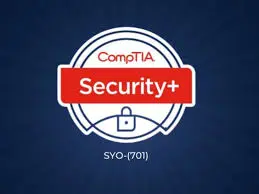ExamPrep: CompTIA Security+
Offline or Online CompTIA Security+ ExamPrep training course.
CompTIA Security+ is one of the most widely recognized entry-level cybersecurity certifications in the world and earning this validates your expertise in protecting IT environments.
This comprehensive course prepares you for the CompTIA Security+ certification by covering all essential topics in information security. Starting with fundamental concepts, you’ll learn about security controls, the CIA Triad, and encryption techniques, equipping you with the knowledge to protect sensitive data. This course will also delve into security models like Zero Trust and practical security strategies, including how to implement effective access controls and authentication frameworks.

Manoj S. Mahajan
28+ years Experienced Trainer with 100+ certs, View full profile....Why join this Comptia Security+ ExamPrep training?
- 100% coverage of the Official Comptia syllabus delivered by Certified Trainer
- Hands-on lab guidance to bridge theory with practical application
- Exam practice questions at the end of each module for reinforcement
- Mock exams to revise and simulate real test conditions

Course Description
This comprehensive ExamPrep course is tailored to equip you with the skills needed to excel as an entry-level cybersecurity tech and to successfully pass the CompTIA Security+ (SY0-701) exam. It covers key topics such as authentication, authorization, network scanning, cryptography, risk management, and attack prevention, ensuring a deep understanding of both theoretical concepts and practical applications.
Additionally, the course delves into securing enterprise environments, addressing incident response, disaster recovery, and business continuity planning.
Audience:
- This course is ideal for IT professionals, network administrators, and anyone pursuing a career in cybersecurity.
- For those aiming to pass the CompTIA Security+ certification exam.
Prerequisites
- Basic knowledge of networking concepts and computer systems is recommended.
- While no prior security experience is required, a foundational understanding of IT operations will be beneficial in navigating the course material effectively.
- Attend free webinars on Server Essentials and Networking Essentials. Click here...
CompTIA Security+ SY0-701 Exam details:
- Exam version: V7
- Exam series code: SY0-701
- Passing score: 750 (on a scale of 100-900)
- Number of questions: maximum of 90
- Format: Multiple-choice and performance-based
- Duration: 90 minutes
Key Features
- Real-time 1 to 1 interaction
- Download short notes
- Get the source code after each lecture
- Get an attendance certificate

Syllabus
Please check the syllabus tab above. ☝- Domain 1: General Security Concepts (12%)
- Domain 2: Threats, vulnerabilities, and mitigations (22%)
- Domain 3: Security Architecture (18%)
- Domain 4: Security Operations (28%)
- Domain 5: Security Program Management and Oversight (20%)
What You'll Learn
General security concepts (12%)
- Security controls: comparing technical, preventive, managerial, deterrent, operational, detective, physical, corrective, compensating, and directive controls.
- Fundamental concepts: summarizing confidentiality, integrity, and availability (CIA); non-repudiation; authentication, authorization, and accounting (AAA); zero trust; and deception/disruption technology.
- Change management: explaining business processes, technical implications, documentation, and version control.
- Cryptographic solutions: using public key infrastructure (PKI), encryption, obfuscation, hashing, digital signatures, and blockchain.
Threats, vulnerabilities, and mitigations (22%)
- Threat actors and motivations: comparing nation-states, unskilled attackers, hacktivists, insider threats, organized crime, shadow IT, and motivations like data exfiltration, espionage, and financial gain.
- Threat vectors and attack surfaces: explaining message-based, unsecure networks, social engineering, file-based, voice call, supply chain, and vulnerable software vectors.
- Vulnerabilities: explaining application, hardware, mobile device, virtualization, operating system (OS)-based, cloud-specific, web-based, and supply chain vulnerabilities.
- Malicious activity: analyzing malware attacks, password attacks, application attacks, physical attacks, network attacks, and cryptographic attacks.
- Mitigation techniques: using segmentation, access control, configuration enforcement, hardening, isolation, and patching.
Security architecture (18%)
- Architecture models: comparing on-premises, cloud, virtualization, Internet of Things (IoT), industrial control systems (ICS), and infrastructure as code (IaC).
- Enterprise infrastructure: applying security principles to infrastructure considerations, control selection, and secure communication/access.
- Data protection: comparing data types, securing methods, general considerations, and classifications.
- Resilience and recovery: explaining high availability, site considerations, testing, power, platform diversity, backups, and continuity of operations
Security operations (28%)
- Computing resources: applying secure baselines, mobile solutions, hardening, wireless security, application security, sandboxing, and monitoring.
- Asset management: explaining acquisition, disposal, assignment, and monitoring/tracking of hardware, software, and data assets.
- Vulnerability management: identifying, analyzing, remediating, validating, and reporting vulnerabilities.
- Alerting and monitoring: explaining monitoring tools and computing resource activities.
- Enterprise security: modifying firewalls, IDS/IPS, DNS filtering, DLP (data loss prevention), NAC (network access control), and EDR/XDR (endpoint/extended detection and response).
- Identity and access management: implementing provisioning, SSO (single sign-on), MFA (multifactor authentication), and privileged access tools.
- Automation and orchestration: explaining automation use cases, scripting benefits, and considerations.
- Incident response: implementing processes, training, testing, root cause analysis, threat hunting, and digital forensics.
- Data sources: using log data and other sources to support investigations.
Security program management and oversight (20%)
- Security governance: summarizing guidelines, policies, standards, procedures, external considerations, monitoring, governance structures, and roles/responsibilities.
- Risk management: explaining risk identification, assessment, analysis, register, tolerance, appetite, strategies, reporting, and business impact analysis (BIA).
- Third-party risk: managing vendor assessment, selection, agreements, monitoring, questionnaires, and rules of engagement.
- Security compliance: summarizing compliance reporting, consequences of non-compliance, monitoring, and privacy.
- Audits and assessments: explaining attestation, internal/external audits, and penetration testing.
- Security awareness: implementing phishing training, anomalous behavior recognition, user guidance, reporting, and monitoring.

Jatin
Training was excellent. Learned things which are helpful in day to day tasks. trainer knowledge level is also excellent. Read more....

Nagesh
I have learn new technology & it is very important for my future life. This institute is best for the IT life. Read more....

Sachin
It was very good experience. Manoj sir's focus on basics helps me to grasp knowledge very quickly and efficiently. Sir not only focused on theory but gave different practicle example which really helpful. I definitely recommend this training to my colleagues. Read more....




